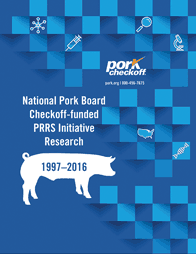News from the National Pork Board (July 2017)
Throughout the year, the National Pork Board is conducting a series of tabletop crisis preparation drills in various pig-producing states that center on the industry’s response to a crisis such as the introduction of a foreign animal disease (FAD). In the first quarter of 2017, Checkoff’s director of swine health and information, Dr Patrick Webb, led daylong drills in Illinois and Utah. To find out more on the content of these drills, he says producers and veterinarians can turn to the revised Transport Quality Assurance manual to read about crisis scenarios and to use the related planning exercises.
For more information, contact Dr Patrick Webb at PWebb@pork.org or 515-223-3441.
 New PRRS Research Book available
New PRRS Research Book available
The National Pork Board’s brand new porcine reproductive and respiratory syndrome (PRRS) virus research booklet is the most comprehensive source of Checkoff-funded research ever available on the subject. This new version, updated and expanded from the 2012 edition, contains Checkoff-funded PRRS research from 1997 to 2016 that can help producers, veterinarians, and researchers alike to learn more about how to control this costly virus. The PRRS Research Book is available online at www.pork.org/research and in limited print editions.
For more information, contact Dr Lisa Becton at LBecton@pork.org or 515-223-2791.
Pork Checkoff awards 22 science scholarships
Each year, the National Pork Board awards scholarships to students seeking to work in the pork industry. This year, Checkoff has named 22 annual scholarship winners representing 11 colleges and universities, with scholarships totaling $48,500. An analysis of education and career paths from the 2010 Pork Industry Scholarship program showed that 92% of the respondents are actively employed in agriculture and 75% of this group are specifically involved in the pork industry. The 2010 class recipients have advanced degrees, including seven with masters degrees, three with doctorates, and three with veterinary degrees.
For more information, contact Dr Chris Hostetler at CHostetler@pork.org or 515-223-2606.
OMS expands outreach to nurse practitioners
Operation Main Street (OMS) speakers are now taking the pork industry’s story to yet another key influencer group – medical professionals. Earlier this year, Illinois OMS speaker Megan Schnur, DVM, with Carthage Veterinary Services, presented to members of the Society of Advanced Practice Nursing in Springfield, Illinois. While preparing for the presentation, Megan asked the nurses what they wanted to know about pig farming. Their main interests were how antibiotics and hormones used in pig farming affect humans who eat pork, and whether humane animal care is a priority on today’s pig farms.
To learn more about OMS, go to www.pork .org or contact Ernie Barnes at EBarnes@pork.org.
Enzyme Webinar series coming in August
The Pork Checkoff’s annual research Webinar series, which kicks off on August 1, will focus on “Use of Enzymes in Swine Diets.” The four weekly Webinars will offer insights into how to use enzymes in swine diets to maximize nutrient uptake from fibrous feedstuffs, and will highlight related research projects. The Webinars will begin at noon (CDT) on each date.
- August 1: How dietary enzymes work – Dr Dean Boyd
- August 8: Gut physiology of pigs fed diets with carbohydrase enzymes – Dr Pedro Urriola
- August 15: Applying enzyme technology to optimize the utilization of fibrous feed ingredients – Dr Eric van Heugten
- August 22: Evaluation of the nutrient uplift provided by xylanase in finishing diets – Dr Merlin Lindemann
To register for these free Webinars, go to www.pork.org/animalscience. For more information, contact Dr Chris Hostetler at CHostetler@pork.org or 515- 223-2606.
Secure Pork Supply work moves forward
Business continuity plan
Recently, the National Pork Board (NPB) asked the Institute for Infectious Animal Diseases (IIAD) to develop a white paper on domestic pork business continuity. It would provide an estimate for the effort and cost required for designing, planning, developing, and implementing a system that allows the US swine industry to collect, store, and share data between producers and animal health regulators for purposes of business continuity. In a workshop held in Des Moines in April, an industry group reviewed the white paper to determine if costs and timelines could be reduced if IIAD and NPB’s IT department worked in tandem on the project. The collaboration is now underway.
Surveillance plan
Iowa State University’s Center for Food Security and Public Health is beginning the process of developing a surveillance testing protocol (collection, testing, and reporting) for oral fluids using spatially balanced sampling. This is a new area of research led by Dr Jeff Zimmerman. A pilot project using porcine epidemic diarrhea virus (PEDV) as the test case is set to start to show proof of concept. Following the pilot, investigators will produce a report for review by the PEDV Taskforce and the Checkoff’s Swine Health Committee.
For more information, contact Dr Patrick Webb at PWebb@pork.org or 515-223-3441.